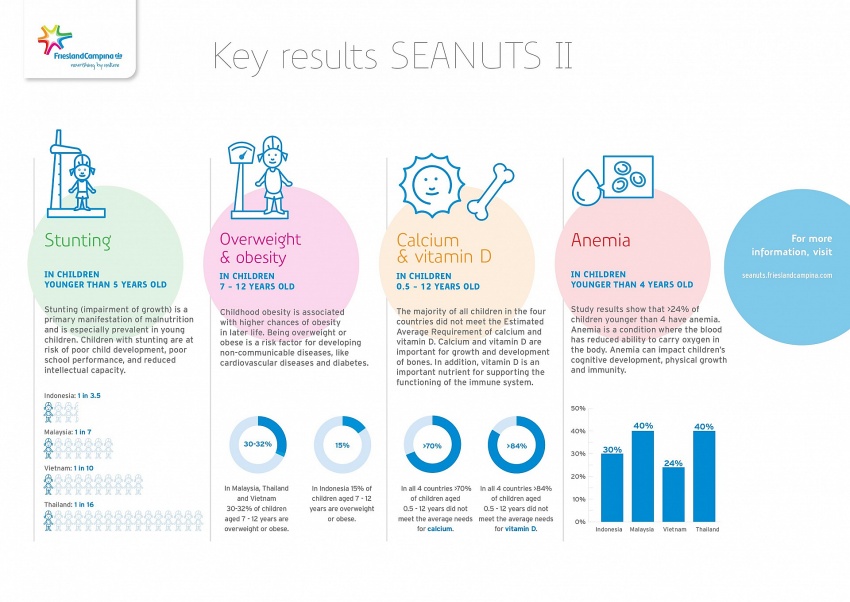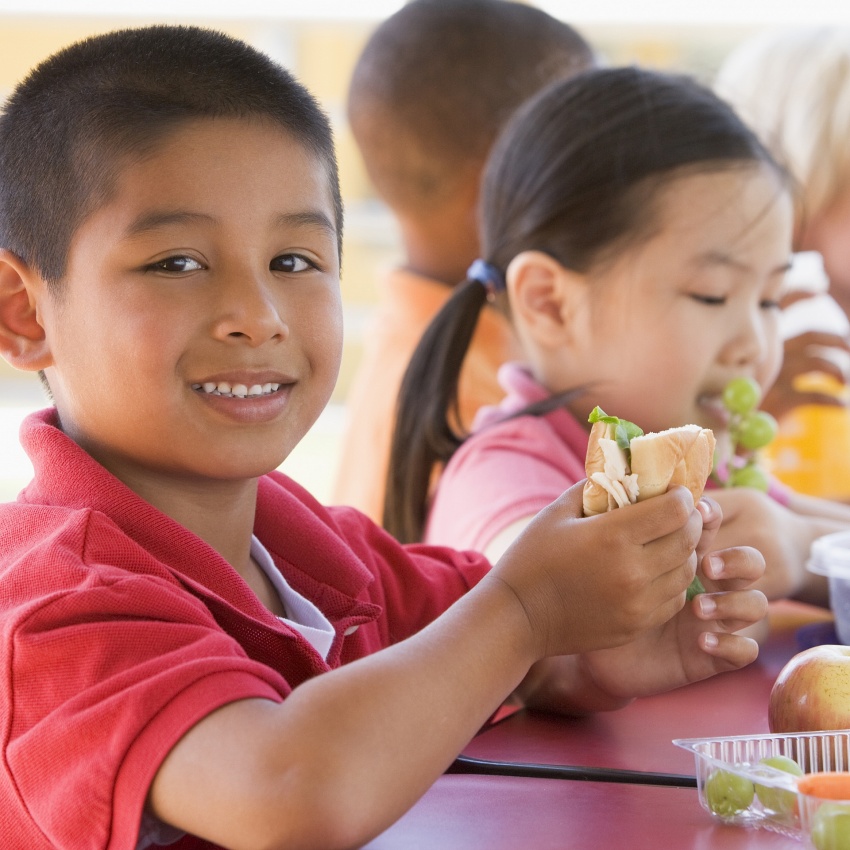FrieslandCampina announces result of SEANUTS II
A recently completed study with nearly 14,000 children, aged six months to 12 years, highlights an important issue known as the triple burden of malnutrition.
This is the coexistence of undernutrition, micronutrient deficiencies, and overweight/obesity. These three burdens often coexist in the same country and can even occur in the same family. The large-scale study, commissioned by FrieslandCampina, was conducted between 2019 and 2021 by leading universities and research institutes in Indonesia, Malaysia, Thailand, and Vietnam.
As one of the leading dairy companies in the world, with a 150-year heritage, FrieslandCampina is committed to providing better nutrition which is affordable and accessible to the increasing population all over the world. The company is doing that by continuous research and innovation, and SEANUTS is one of the most important studies.
 |
| FrieslandCampina announced the results of the SEANUTS II study |
This new study follows the Southeast Asian Nutrition Surveys (SEANUTS I), which were presented in 2012. Overall, this second study (SEANUTS II) shows that stunting and anaemia still exist, especially in younger children.
However, for older children, there is a higher prevalence of overweight and obesity. Also, most children do not meet the average needs for calcium and vitamin D intake and show vitamin D insufficiencies. This triple burden makes it a matter of great importance to fill nutritional gaps with proper nutrition interventions and educational programmes.
Commenting on the study’s findings, Dr. Poh Bee Koon, principal investigator for SEANUTS II in Malaysia and professor of Nutrition at UKM’s Faculty of Health Sciences at the Centre for Community Health Studies explains, “Healthy nutrition is about balance, moderation, and variety. If children don’t get the nutrition they need, they won’t grow and develop properly. Our new study revealed that more than 70 per cent of the children in all four countries did not meet the average needs for calcium and more than 84 per cent did not meet the average vitamin D requirements. These numbers emphasise an urgent need to improve food security, as well as the availability of food products that meet the children’s needs, thus increasing access to healthy nutrition.”
Margrethe Jonkman, global director of Research & Development at FrieslandCampina stated, “Research is key to getting a better understanding of local nutritional needs. The results from this study will help FrieslandCampina in developing better and more affordable products that meet the nutritional needs of children and in setting up programmes to promote a well-balanced diet and active lifestyle in collaboration with local authorities, health workers, and schools.”
 |
| The results of SEANUTS II show that malnutrition remains a huge challenge among children in Southeast Asia |
According to Jonkman, FrieslandCampina Vietnam (FCV) developed various new dairy products based on the SEANUTS I results, meeting the nutrition needs of Vietnamese kids.
“Moreover, we designed the social mission campaign “Drink, Move, Be strong”, to promote a healthy lifestyle. From 2020, we scaled up the programme through a strategic partnership with the Ministry of Education and Training of Vietnam, by starting the five years campaign “For Vietnam to leap forward and reach higher”, focusing on nutritional education and the development of physical playgrounds at primary schools nationwide.”
Richard Kiger, managing director of FCV also said, “The SEANUTS II results will help to better tailor the “For Vietnam to leap forward and reach higher” programme to the needs of Vietnamese children to improve their physical and mental development”.
| SEANUTS II was conducted in Indonesia, Malaysia, Thailand, and Vietnam. In total, 13,933 children, aged six months to 12 years, were recruited from urban and rural schools, community health centres, and sub-district administrative organisations in these four countries. Principal investigators from leading universities and research institutes, together with their expert teams, were responsible for the study design. Together with the local mobile field teams, they conducted the data collection between 2019 and 2021. SEANUTS II was commissioned and sponsored by FrieslandCampina. The survey was conducted in collaboration with the University of Indonesia; the Universiti Kebangsaan Malaysia; the Mahidol University (in Thailand) and the National Institute of Nutrition (in Vietnam). The first study, SEANUTS I, was conducted in 2010 and 2011. The findings of SEANUTS II are presented during a digital conference on June 17-18, 2022. |
What the stars mean:
★ Poor ★ ★ Promising ★★★ Good ★★★★ Very good ★★★★★ Exceptional
Related Contents
Latest News
More News
- Masan Consumer names new deputy CEO to drive foods and beverages growth (February 23, 2026 | 20:52)
- Myriad risks ahead, but ones Vietnam can confront (February 20, 2026 | 15:02)
- Vietnam making the leap into AI and semiconductors (February 20, 2026 | 09:37)
- Funding must be activated for semiconductor success (February 20, 2026 | 09:20)
- Resilience as new benchmark for smarter infrastructure (February 19, 2026 | 20:35)
- A golden time to shine within ASEAN (February 19, 2026 | 20:22)
- Vietnam’s pivotal year for advancing sustainability (February 19, 2026 | 08:44)
- Strengthening the core role of industry and trade (February 19, 2026 | 08:35)
- Future orientations for healthcare improvements (February 19, 2026 | 08:29)
- Infrastructure orientations suitable for a new chapter (February 19, 2026 | 08:15)

 Tag:
Tag:

























 Mobile Version
Mobile Version